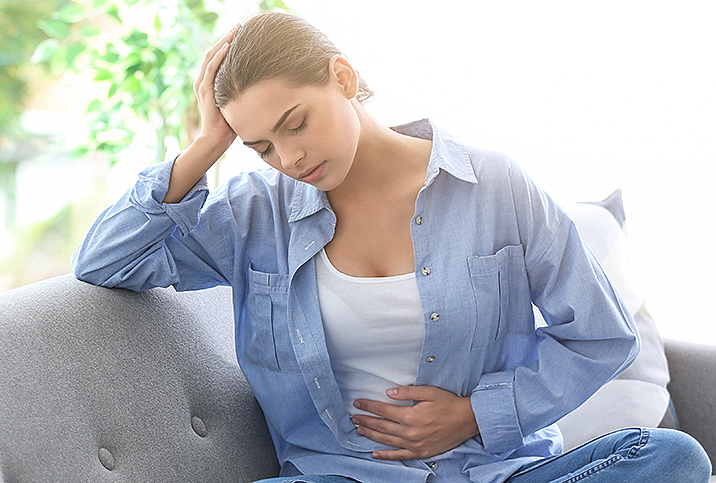Can Endometriosis Increase Your Risk of Cancer?

Endometriosis is a difficult health condition to handle all on its own. But does having endometriosis also increase your risk of cancer? Let's look at the causes of endo and speak to the experts to find out.
What is endometriosis?
Endometriosis occurs when tissue resembling the lining of the uterus, aka the endometrium, spreads outside of the uterus, said Eduardo Hariton, M.D., M.B.A., a reproductive endocrinologist at the Reproductive Science Center of the San Francisco Bay area.
This tissue can attach to the ovaries, the pelvic cavity's lining, the fallopian tubes, the outer surface of the uterus or other parts of the lower abdomen.
"The exact cause of endometriosis is unknown, but several theories have been proposed to explain its development, including retrograde menstruation, genetic predisposition and immune system dysfunction," Hariton said.
Retrograde menstruation is the most widely accepted theory, according to Hariton. It states that the tissue similar to the lining of the uterus (endometrial tissue) travels back through the fallopian tubes and implants on other pelvic organs, growing out of control and leading to endometriosis.
What are the symptoms of endometriosis?
It's thought that at least 11 percent of American women between the ages of 15 and 44, or more than 6.5 million women, have endometriosis, according to the Office on Women's Health.
Endometriosis symptoms can significantly impact a woman's quality of life. These symptoms may include the following:
- Chronic pelvic pain
- Painful menstrual cramps
- Painful bowel movements or urination
- Pain during or after sex
- Vaginal bleeding between menstrual periods
- Fatigue or lack of energy
- Depression, isolation or anxiety
- Infertility
- Digestive problems (e.g., diarrhea, constipation, bloating or nausea)
Some of these symptoms are similar to those of reproductive cancers such as types of ovarian cancer or endometrial cancer. But is there any overlap between endometriosis and cancer?
Does endometriosis put you at an increased risk of cancer?
Endometriosis itself does not directly increase the risk of cancer. Endometriosis has only been associated with an increased risk of ovarian cancer and only in very specific contexts, said Melissa Lumish, M.D., a board-certified medical oncologist specializing in the treatment of gynecologic cancers at Memorial Sloan Kettering in the New York City area.
"To my knowledge, it hasn't been actually associated with increased risk of cervical cancer," she added.
Endometriosis has only been associated with an increased risk of ovarian cancer.
Some studies have suggested a possible link between endometriosis and an increased risk of certain types of gynecological cancers, such as ovarian and endometrial cancer, according to Hariton.
"This may be due to the fact that women with endometriosis have a higher chance of developing abnormal growths—called endometrial implants—in the pelvis, which could potentially lead to cancer over time," he said.
Note, however, that while this association has been observed in some studies, the overall risk of cancer in women with endometriosis is still low.
What is the lifetime risk of developing ovarian cancer?
Specifically, the lifetime risk of developing ovarian cancer for women in the general population is estimated to be 1.31 percent, or 1 woman in 78, according to a 2018 report.
"However, for women with endometriosis, the risk is slightly higher at 1.80 percent, which is fewer than 2 women in 100," Hariton explained.
It's important to understand the difference between absolute and relative risk when interpreting these numbers, according to Hamilton. Absolute risk refers to the actual probability of an event occurring, whereas relative risk compares the likelihood of an event happening between two groups.
Meta-analyses of endometriosis and ovarian cancer have found the relative risk to be as high as 1.42, Hariton said.
This number means that women with endometriosis are 1.42 times more likely to develop ovarian cancer compared to women without endometriosis. However, the absolute increase in risk is still considered to be low, at only 0.49 percent.
The lifetime risk of ovarian cancer among women with endometriosis is low and only slightly different from the risk for women without endometriosis.
"This information should provide reassurance to women with endometriosis that their overall lifetime risk of ovarian cancer remains low," Hariton said. Regular gynecological check-ups can help monitor for potential changes.
If you have any concerns about your vaginal health, talk to your doctor.
Do endometriosis treatments increase or reduce cancer risk?
The research on the effects of endometriosis treatments on cancer risk is limited. Although it's difficult to say anything definitive, some treatments for endometriosis actually might lower the risk of ovarian and endometrial cancer, Lumish said.
For example, birth control pills are used for many reasons, including treating endometriosis, according to Hariton.
"Birth control pills, in the general population, can lead to a lower risk of endometrial cancer (30 percent risk reduction) and ovarian cancer (30 percent to 50 percent risk reduction), compared to patients who have never taken birth control pills," Hariton said.
While the effect in patients with endometriosis may be slightly different, theoretically, there is likely a similar effect in endometriosis patients.
Other endometriosis treatments block the hormone that stimulates the production of estrogen (such as Lupron), and they have not been associated with an increased or decreased risk of ovarian cancer, Lumish added.
There is a medication for endometriosis called Danazol that increases androgens (male-type hormones). The increase in male hormones is a secondary effect of the drug. The mechanism by which it treats endometriosis is actually by inhibiting pituitary secretion of follicle-stimulating hormone (FSH) and luteinizing hormone (LH), Lumish said.
"However, that actually has been associated with an increased risk of ovarian cancer," she added.
None of these theories regarding endometriosis increasing or decreasing the risk of ovarian cancer are proven.
"It's just what's been reported in the literature," Lumish said.
What should you know about potential risk factors?
Women with endometriosis should try to maintain a healthy lifestyle, including a balanced diet, regular exercise and stress management. Doing so can help maintain overall health and reduce the risk of health problems.
Women with endometriosis should know the symptoms of ovarian cancer, which Hariton listed as including:
- Bloating
- Pelvic pain
- Difficulty eating or feeling full quickly
- Urinary symptoms (urgency or frequency)
If a woman with endometriosis experiences any of these symptoms, she should speak with her doctor as soon as possible.
"While there are no screening tests for ovarian cancer, regular gynecological check-ups and expedient follow-up of any symptoms can help evaluate any changes and detect any potential issues early on," Hariton said.
The bottom line
Endometriosis does not rapidly raise your risk of developing cancer cells. Common treatment options may help reduce the risk of certain types of cancer. If you experience new or worsening symptoms, speak with your doctor.


















